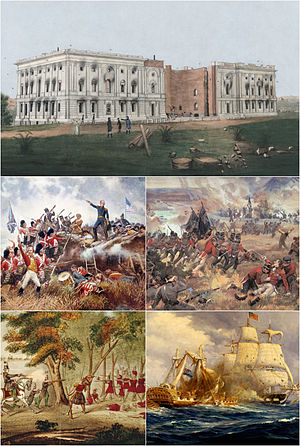American War of 1812
| War of 1812 | |||||||
|---|---|---|---|---|---|---|---|
 Clockwise from top: damage to the U.S. Capitol after the Burning of Washington; the mortally wounded Isaac Brock spurs on the York Volunteers at the battle of Queenston Heights; USS Constitution vs HMS Guerriere; The death of Tecumseh in 1813 ends the Native armed struggle in the American Midwest; Andrew Jackson defeats the British assault on New Orleans. |
|||||||
|
|||||||
| Belligerents | |||||||
| Commanders and leaders | |||||||
| Strength | |||||||
|
|
||||||
| Casualties and losses | |||||||
|
2,200 killed in action
|
1,160 killed in action
|
||||||
|
|||||||
2,200 killed in action
1,160 killed in action
The War of 1812 (1812–1815) was a conflict fought between the United States and the United Kingdom and their respective allies. Historians in Britain often see it as a minor theatre of the Napoleonic Wars; however, in the United States and Canada, it is seen as a war in its own right.
Since the outbreak of war with Napoleonic France, Britain had enforced a naval blockade to choke off neutral trade to France, which the United States contested as illegal under international law. In order to man the blockade, Britain forcibly impressed American merchant sailors into the Royal Navy. Well-publicised impressment actions, such as the Leander Affair, and the Chesapeake-Leopard Affair, enraged the American public. The British were in turn outraged by the Little Belt Affair, which resulted in the deaths of 11 British sailors. Moreover, British political support for a Native American buffer state, which conducted raids on American settlers on the frontier, hindered American expansion. On June 18, 1812, President James Madison signed the American declaration of war into law.The British government had done everything in its power to try to avert the war and was therefore dismayed by the American declaration. Senior figures such as Lord Liverpool Lord Castlereagh believed it to have been an opportunistic ploy by President Madison to annex Canada while Britain was fighting a war with France. The view was shared in much of New England, whose leaders bitterly disputed the numbers of US sailors the War Hawks claimed had been impressed by the British.
...
Wikipedia
